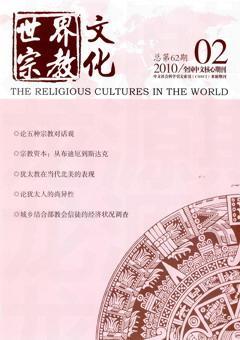本期主要文章英文摘要
张晓梅 译
On the Five Theories of Interreligious Dialogue
Zhang Zhigang
Abstract: Interreligious dialogue is a much heated subject and a forefront field of research in the
international academia of religious studies. This article gives a brief summary of the five most
influential theories of religious dialogue, i.e. exclusivism, inclusivism, pluralism, compatiblism
and practicalism, and tries a comparative methodological reflection on them. The author believes
that all the five have their theoretical bases not to be dismissed; they all have both merits and
deficiencies that need to be reviewed thoroughly. Thus for a discussion of the difficult questions
in the field of Interreligious dialogue and our search for theoretical breakthroughs, it would be
of great help if we can reflect from a theological-philosophical perspective on the academic
controversy among the five, balancing the theoretical tensions among them.
Key Words: Five theories of Interreligious dialogueMethodological reflection
Religious Capital: krom Bouraieu to stark Author Terry ReyEdited and Translated by Li Wenbin
Abstract: The notion of"religious capital" is central to the development of rational choice theory. However,
definitions of the term are sometimes elusive and/or divorced from its original intellectual
architecture(s), and two streams of thought on the term have emerged without much confluence or
conversation: one largely European and sprung from the work of Max Weber and Pierre Bourdieu;
the other largely American and sprung from the work of Laurence Iannaccone and Rodney Stark.
Terry Rey assesses the two streams of thought comparatively, while tracing the genealogy and
considering certain applications and criticisms of the concept of religious capital and its younger
theoretical sibling "spiritual capital", and proposes two original modifications of the term
("institutional religious capital" and "popular religious capital") toward overcoming problematic
issues identified in the scholarly literature.
Key Words: Religious capitalRational choiceInstitutional capitalPopular capital
Judaism in Contemporary North America
Xu Xin
Abstract: As the father of all monotheisms, Judaism shows its essential in two aspects: to have faith in God
and to obey the Law. As faith in God has been seen merely as the premise of Judaism, it has never
put much emphasis on a discussion of the essence of God. Thus to obey the Law has become the
virtual subject of Judaism. Whether or not one obeys the law in his/her daily life is the criterion
between Judaism and other forms of monotheism. It is also the criterion to accept one as an
observant Jew. Jews and Judaism are inseparable, which manifests itself in the daily observance
of the Law, although the degree varies in different times. Herein Judaism puts much emphasis
on observance of the Law in one's everyday life, but it is not a rigid religion. As to the meaningsof the Law, it has left a window for "free" interpretations. It allows each generation of theJewish people to interpret the Law from their own time, place and actual life conditions, makingadditions or deductions as necessary. New interpretations can be given that will meet people'sneeds and guide their lives. Today's Jews in North America show a great pluralism in theirpractice of the Jewish law. It's a vivid indication of the Jewish tradition of free interpretation ofthe Law and taking new thoughts into the system. To know more about the new faces of Judaismin contemporary North America will help us understand its development trends in today's world.
Key Words: JudaismLawNorth American
On the Particularism of Jews
Fu Youde
Abstract: Particularism is a feature of the Jews. It is contained in the basic faith and doctrines of Judaism
and manifested in the life style, thinking pattern, history and reality of the Jewish people. The
prominence shown by Jews in various fields has a lot to do with this partieularism. At the same
time, it has contributed to a certain degree to the miseries and sufferings of the people. The
purpose of partieularism is to draw a line between Judaism and other religions, thus separating
Jews from gentiles. Particularism of the Jews and their insistence upon conducting themselves
differently from other peoples in the world are theoretically rooted in the values of freedom and
equality in the Bible, and can be traced back ultimately to a particular monotheism. To understand
the particularism of the Jews can be of great importance for the Chinese people who generally
uphold universalism.
Key Words: ParticularismJewish life styleThinking patternFreedom and equality
Investigation into the Economic Conditions of Church Members in the City-Country Conjunct Region: A Case Study on D Town, S City
Tao Feiya, Wang Enle
Abstract: The D church in S City, located in the city-country conjunct area of a metropolis, is constituted
mostly by peasant workers. Our research shows that members of the church are underedueated;
most of them work as temporary workers or contract workers, or in self-employment, their
income lower than that of an average city resident. Participation in church activities does not
show a significant impact on their economic conditions, but Christian faith has a positive effect
on their economic morals and business honesty. At the same time, religious faith apparently can
provide comfort to a person living in an unstable, dangerous economic environment. The authors
have found that the D church is not an example of the mutual advancing effect between Protestant
ethics and economic development as proposed by Max Weber. Improvement of the economic
conditions of peasant worker church members in the city-country conjunct region depends on
non-religious factors.
Key Words: Christian faithEconomic conditions study

